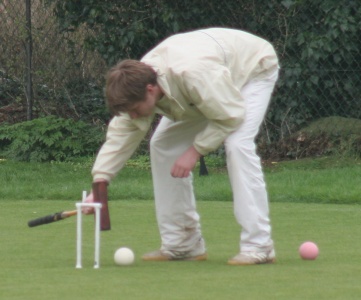
Association Croquet Refereeing
 A hampered shot in which a fault may be committed should be watched by a referee.
A hampered shot in which a fault may be committed should be watched by a referee.
The players are jointly responsible for the conduct of all games, even in tournaments, in the absence of a referee. However, a qualified referee (if available) should be asked to adjudicate any stroke in which a player suspects a fault may be committed, or in the event of uncertainty as to how to proceed with the game.
Croquet England makes provision to train and examine three grades of AC referee:
AC Assistant Referee: an assistant referee can officiate at any game, match or event (for major tournaments: if so authorised by the Tournament Referee) to deal with any matters covered by R7.2, and in addition the following matters covered by R3:
a) whether a claim for a wiring lift is valid; or
b) to watch a stroke to determine its outcome, including whether a fault is made; or
c) whether a ball has run a hoop in order or is or can be put in a position to do so.
AC Referee: a full referee can officiate at any AC game, match or event (for major tournaments: if so authorised by the Tournament Referee).
AC Championship Referee: some of the most experienced AC Referees have qualified to officiate at top-class events.
In addition, there are AC Examining Referees who are responsible for training and qualifying new referees - most Federations have at least one.
The powers and duties of referees are spelt out in the Tournament Regulations.
Usually, a referee acts as a Referee on Request - called on by the players either to watch a problematic stroke about to be played, or to sort out a problem after it has happened.
Occasionally, when the situation demands, a referee may be asked to supervise a match and become a Referee in Charge.
All significant tournaments controlled by Croquet England or a Federation will usually have an appointed Tournament Referee: the official responsible for nominating and allocating authorised referees, and hearing appeals.
Resources for Referees and Players
A number of resources are available to help players, existing AC Referees and those considering becoming a referee:
- The Croquet England slow-motion videos - stroke guidance for players and referees. When made in 2006, these videos revolutionised our understanding of what happens in many normal strokes played in AC and GC. Any serious player or aspiring referee will benefit from studying these videos.
- USCA Croquet Referee #10 Double Taps, Crushes, Bevelled Edge Faults - a video on Bob Kroeger's website in America, very relevant for us.
- Hammer Shots video - By Bob Kroeger
- Sweep shots video - Another video by Bob Kroeger
- Assistant Referee Manual
- a Laws Quiz to help you gain an understanding of the laws and test your knowledge
Becoming a Referee
The Laws committee are currently revising the process to become an AC referee. The new process involves the following steps:
1. Download and read the Assistant Referee Manual.
2. Review the videos on faults (see above).
3. Go to the Laws quiz and practice answering questions on the laws. You can select the tag 'Assistant Referee Questions' to focus on the questions an Assistant Referee should know.
4. When it is available (it is currently under development) take the test from the laws quiz link above. You can try this as many times as you need to to get your certificate. Note that passing the on-line test, while a necessary step, does not qualify you as an Assistant Referee by itself, it is a precursor to attending a one-day Assistant Referee course and taking the on-the-lawn test.
5. Take the new one-day practical Assistant Referee course. This will be lead by an Examining Referee, and in most cases it will be possible to take the on-court test on the same day. If not you can arrange with an Examining Referee to take the test on another occasion. Passing the on-court test together with the on-line test certificate qualifies you immediately as an Assistant Referee.
6. If you want to progress to become a full AC Referee, then you will need to take a test on the more complex aspects of AC Law. This can be administered by an Examining Referee on-line. However, before you try this it is strongly recommended that you attend the series of on-line zoom/teams seminars which will be available, and which are intended to provide a more detailed understanding of the Laws and to prepare you for the test. If you wish to attend these seminars, please contact the chair of the AC Laws committee Jeff Dawson, who will make sure you know when the next seminars are running.
7. After two years of experience as a full referee, you can retake the examination, with two examiners for the practical, to become a Championship Referee by achieving the higher pass mark.
If you would like to go down this path to become a Referee, then the practical one-day courses will be available either at a training academy (see the fixtures book), or can be arranged privately with an Examining Referee (listed here). If you can't find an Examining Referee to help you, and you have a group of 4 or more people who would like to take the course, contact the chair of the AC Laws Committee Jeff Dawson who will do his best to assist you in making arrangements.
 Using this website
Using this website

